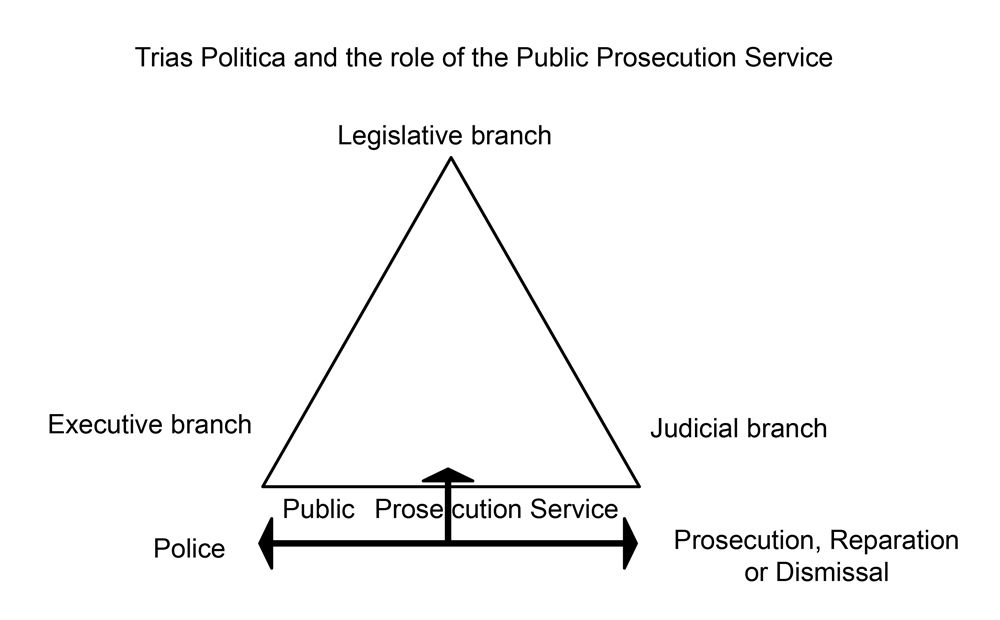About the Public Prosecution Services SXM
What is the Public Prosecution Service?
The Public Prosecution Service is an organization that is tasked with the enforcement of criminal law, on behalf of a country. The Public Prosecution Service executes its duties on the premises of the consensus Kingdom Act Public Prosecution Service.
The Public Prosecutor examines the grounds to bring a suspect before the Judge in the Court of First Instance to face criminal charges. A suspect or the Public Prosecution Service can lodge an appeal if the suspect or the Public Prosecution Service disagrees with the judge’s verdict in the Court of First Instance.
In the court of appeals the Public Prosecution Service is represented by the Attorney General or, on his/her behalf, the Solicitor General. The Attorney General and the Solicitor General both work at the Public Prosecutor’s Office.
De kerntaken van het Openbaar Ministerie zijn:
- Onderzoek naar strafbare feiten
- Vervolgen van strafbare feiten
- Toezien op de implementatie en uitvoering van strafrechtelijke uitspraken
The core tasks of the Public Prosecution Service can be divided into three categories:
- Investigate criminal acts
- Prosecute criminal acts
- Oversee implementation and execution of criminal sentences
However the Public Prosecution Service also:
- Keeps the public informed about ongoing cases or issues
- Offers advice to the Minister of Justice in terms of law and order
- Support and integral approacH
What are the tasks of a Public Prosecutor?
A Public Prosecutor is a law officer (Public Defender) who conducts criminal proceedings on behalf of the government or in the public interest. The police are responsible for investigations when a criminal act is committed, while the ultimate responsibility for the investigation lies with the Public Prosecution Service.
The Public Prosecutor monitors the investigation to ensure that it is conducted thoroughly and in accordance with the law. When the investigation is completed, the Public Prosecutor can decide to present the case to the court. The Public Prosecutor ensures that the defendant is summoned. A summons is a letter that contains the accusations against the suspect.
During court proceedings the Public Prosecutor elaborates on the accusations against the suspect. Thereafter the judge interrogates the suspect about the case. The Prosecutor is also allowed to post questions, as well as the lawyer of the defendant. In concluding the Prosecutor presents his/her argumentation in support of the penalty demanded.
Lady Justice
The ancient Greeks had a goddess of justice, Themis. The Romans called that goddess Justice. That is also where the word justice comes from. In legal buildings you often see a statue of Lady Justice or a painting. So Lady Justice is the goddess of justice.
Justice is always depicted with a scale and a sword, sometimes also with a blindfold. These objects are symbolic of legal tasks.
- The scale: stands for balance. A judge must carefully weigh the arguments of both parties.
- The sword: is the symbol of the power of decision, the judge has to make the decision. He has to issue a verdict.
- The blindfold: There are different opinions about the blindfold. Sometimes Lady Justice is blindfolded, sometimes she is not blindfolded, and there are also images of Lady Justice where she is only blindfolded on one eye. A fully blindfolded Lady stands for impartiality. Judging without regard to persons. However, there are also good arguments to the effect that Lady Justice should not be blindfolded. When determining a punishment, for example, the judge must also look at the personal circumstances of the accused. For that very reason, Lady Justice must not be blindfolded.
Justice is the symbol of the judiciary. Every Public Prosecutor and every judge must be impartial, capable of properly weighing the odds of the situation and able to demand or give the right punishment. (Source: rechtersenadvocaten.nl)
The Trias Politica, the separation of powers is an important principle of modern democracy. It goes back to the ancient Greek concept of social organization, and especially to the distribution of the exercise of power. This means a division of power into legislative, executive and judicial power, which may never rest with one and the same person or body.
- Legislative powers write the law: States and Parliament.
- Executive powers act upon and propose laws : Ministers, Civil Servants, Police.
- Judicial powers implement law: Independent Court and the Public Prosecutor’s Office.
In the purest form of distribution of powers, the parliament has the power to pass laws, but their implementation and enforcement (e.g. by the police) are left to the government. The parliament acts as controller of the executive branch.
In addition, there are independent judges, who, on the basis of the law (adopted by the Parliament), administer justice and have the power to punish crimes and to judge disputes between citizens. That’s what we call the judiciary. Parliament and the government have no say in the judge’s judgment.

There is also a separation between the standing judiciary (the Public Prosecution Service) and the incumbent judiciary (the judge). The Public Prosecutor’s Office is again subject to the Minister of Justice, but in principle it is independent. (Source: montesquieu-institute.eu)